What happens if 143 webmasters build websites from scratch for 6 months based on content generated by neural networks? It’s time to take stock of the competition and find out who won $2,500!
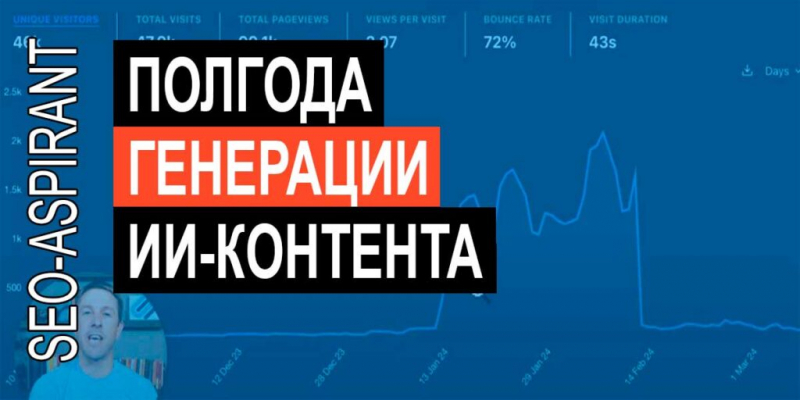
Recommendation of the month: Telega.in — a platform for native integrations in Telegram channels. Manually verified channels and bots. We help you find your target audience in Telegram and launch effective integrations.
- How it all started
- The first months of the SEO marathon
- 7 million articles in 4 months
- Results of the experiment
- What was the winning SEO strategy?
- Conclusion
How it all started
6 months ago, Spencer Hawes launched a marathon in which 143 webmasters competed among themselves for a prize of $2,500. The main goal was for each of the participants to launch a new website based on AI-generated content.
No restrictions on niches or link building. It was possible to launch a classic information site, which most of the participants did. It was possible to open a store on Etsy. The main thing is not to use drop domains, since the essence of the event was precisely in the content.
There were also no restrictions on the tools that participants could use to generate texts and media. On the contrary, there was a recommendation from the organizer to show maximum creativity in this direction.
During the marathon, Spencer invited well-known SEO specialists to the community, who shared with the participants their experience not only in terms of optimizing and promoting websites, but also using AI for this purpose.
It is noteworthy that almost in parallel with the launch of the marathon, Google began rolling out its September update of useful content. And, as it turned out, it was one of the most extensive algorithm updates in the history of SEO.
The second funny coincidence was the date of the end of the competition on April 1, 2024. In fact, it was the middle of the rollout of the March update of the core of the Google search algorithm, from which many have not moved away to this day.
In short, the time for such experiments was chosen as “successful” as possible!
The first months of the SEO marathon
During the first 72 days of the competition, clear favorites were determined, who managed to achieve 1,000 clicks per month of organic traffic from Google. Yes, the numbers are small. But considering that this is a bourgeoisie, and that the sites are brand new, the results are pretty good.
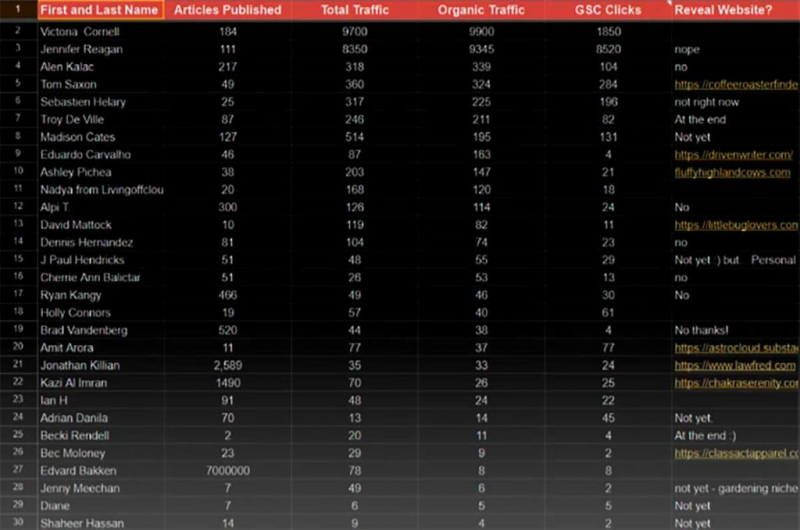
Jennifer, who was in second place at the time, received 8,500 clicks from Google organic in the second month of her site’s development. In my opinion, these are quite impressive figures.
In addition to the first successes of the race leaders, it was interesting to observe how quickly people refuse to participate and drop out. In about 2 months, a third of the participants fell off. After 3 months, there were only 53 people left.
7 million articles in 4 months
In the fourth month of the race, a webmaster named Edward broke into the top. He generated 7,000,000 articles for one of his sites using AI. This earned him almost 23,000 clicks from Google organic search.

The rest of the participants had published between 100 and 300 articles at that time, on average.
The natural result of such an explosive growth of the site on AI content was a filter from the search giant. And although the webmaster technically continued to lead in traffic in the fifth month of the marathon in the table, he could not recover.
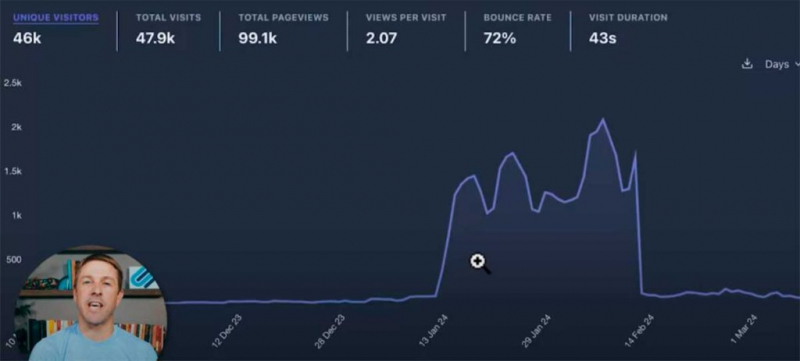
By the way, Jennifer, who was mentioned above, also received punishment from Google at the end of March. And she also couldn’t restore her traffic, even though she only had a couple hundred articles on her site.
Expected. Google has engaged in a massive massacre of sites based on AI content and without a strong brand. A similar fate befell other participants of the competition. But not all of them.
The results of the experiment
In April, the SEO marathon officially ended. The results were summed up. Only 23 people out of 143 participants reached the end.
Surprisingly, the competition in the top was very tight. The third place was taken by the same Edward – with his second site (6,332 articles – 10,103 clicks from Google organic search). The second place is – Tonya with a recipe site (342 articles – 10,505 clicks).
Victoria got the first place and $2,500. 234 articles – 12,398 clicks.
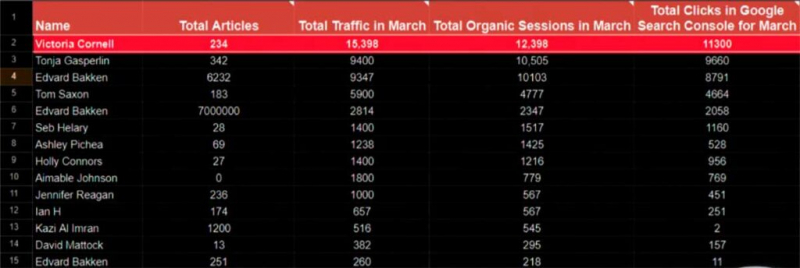
What was the winning SEO strategy?
According to the winner:
- Articles were published regularly. As fast as a human editor could do it.
- About 250 articles were published in 6 months. But, as Victoria herself said: if she had started everything from scratch with her current experience, she would have published about 2-3 articles a day (it would have turned out 2 times more).
- Each article followed the AI through a live editor. So there is no 100% AI content on the site.
- Before creating content for each article, a full-fledged keyword research was conducted.
- Link building was used in the promotion. At the end of the marathon, her site had 200 donor domains and DR 26.
- Koala AI was used to generate content (koala.sh ).
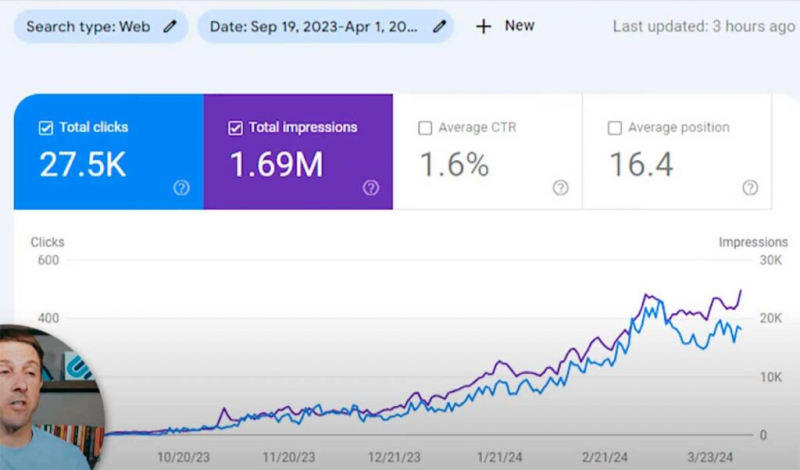
As can be seen from the GSC of Victoria’s website, the growth of organic impressions and clicks went quite smoothly, without sharp ups and downs. Google’s March update may have cut it a little, but it didn’t affect the result much.
Here is its organic data for March:
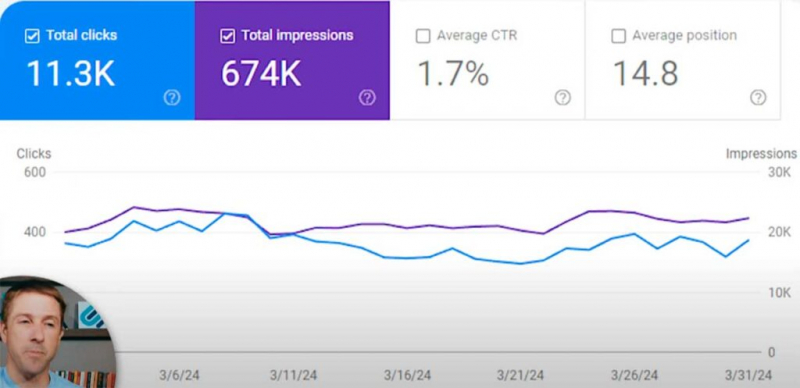
I think an important element of the site’s success in organic search was at least some kind of diversification of traffic channels. If you look at the breakdown of sources in GA4, you will find that Flipboard (content aggregator) is in second place in terms of volume.
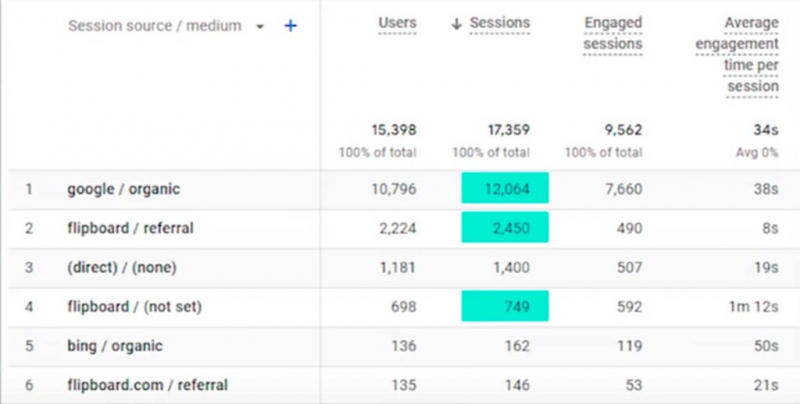
In addition to Google, the site receives traffic from search engines such as Bing, DuckDuckGo, Yahoo and Ecosia.
Conclusion
Given what is happening in Google’s organic right now, in my opinion, SEO needs to be diversified at the moment. Additional traffic sources are needed: social networks, aggregators, forums and similar things.
As for AI content, obviously, there are two main ways to use it to make money on the Internet:
- We buy a domain with a history, raise a website on it and upload as much AI content as we can, while earning several months on contextual advertising, links and push notifications. Then we get a filter from Google and go to make the next site.
- We generate content for our site using AI, but each article is additionally processed by a live editor. That is, we use a neural network as a replacement for a copywriter.
Both approaches are working and proven in practice. Which one to choose is up to you.
Good luck!
